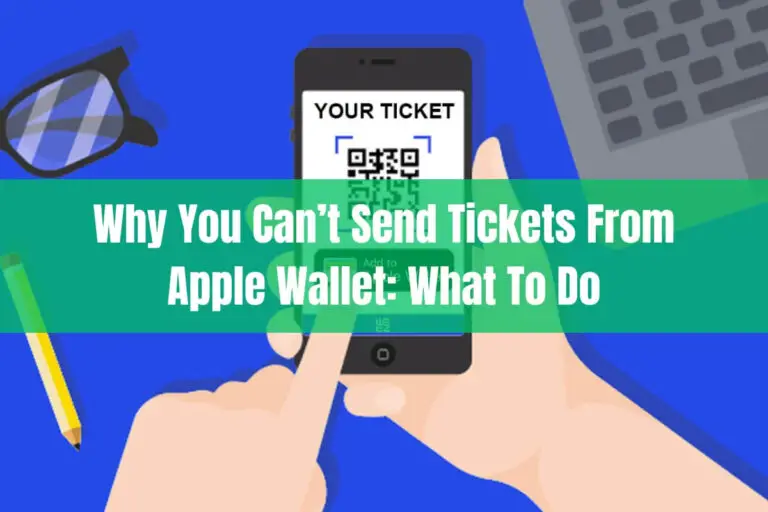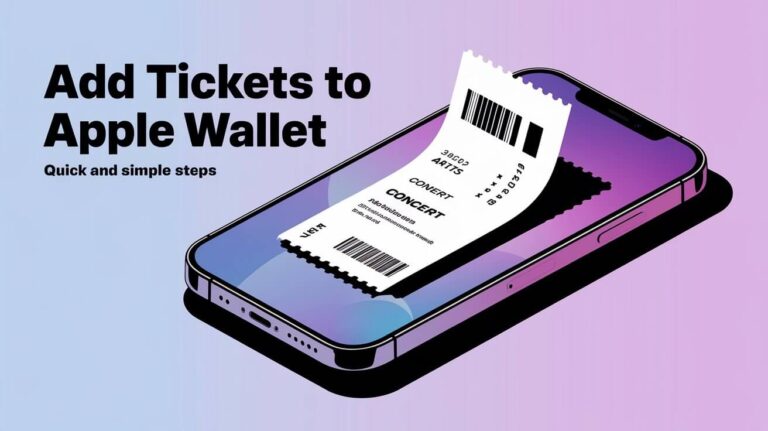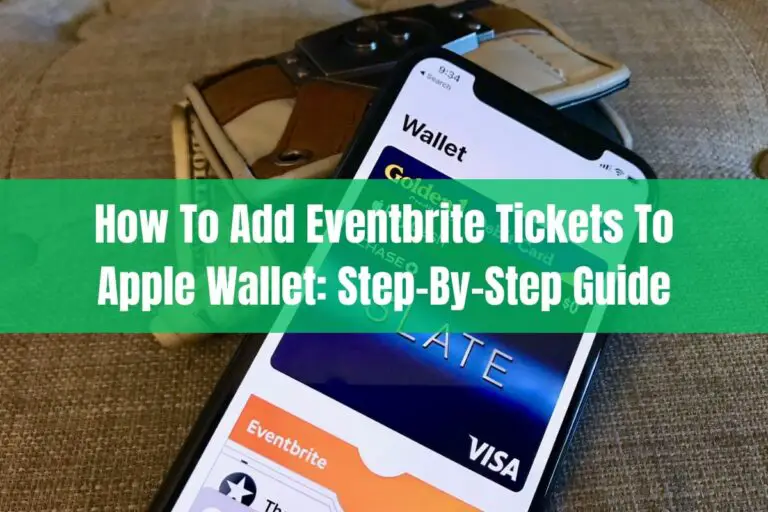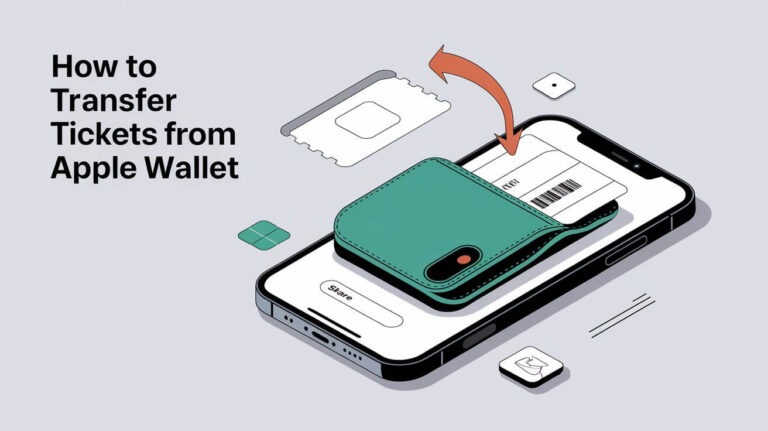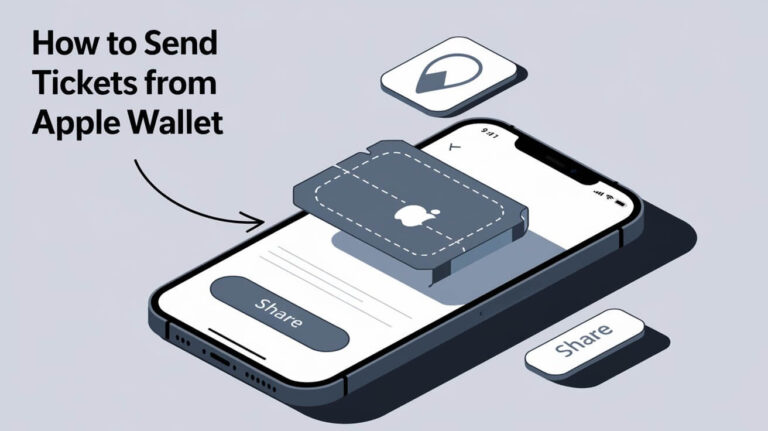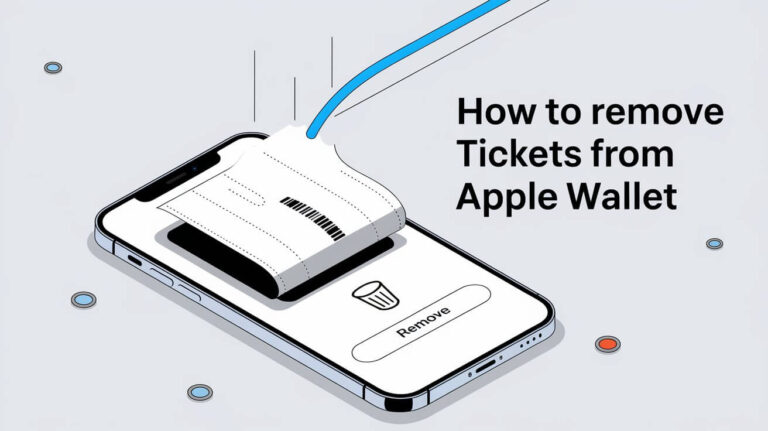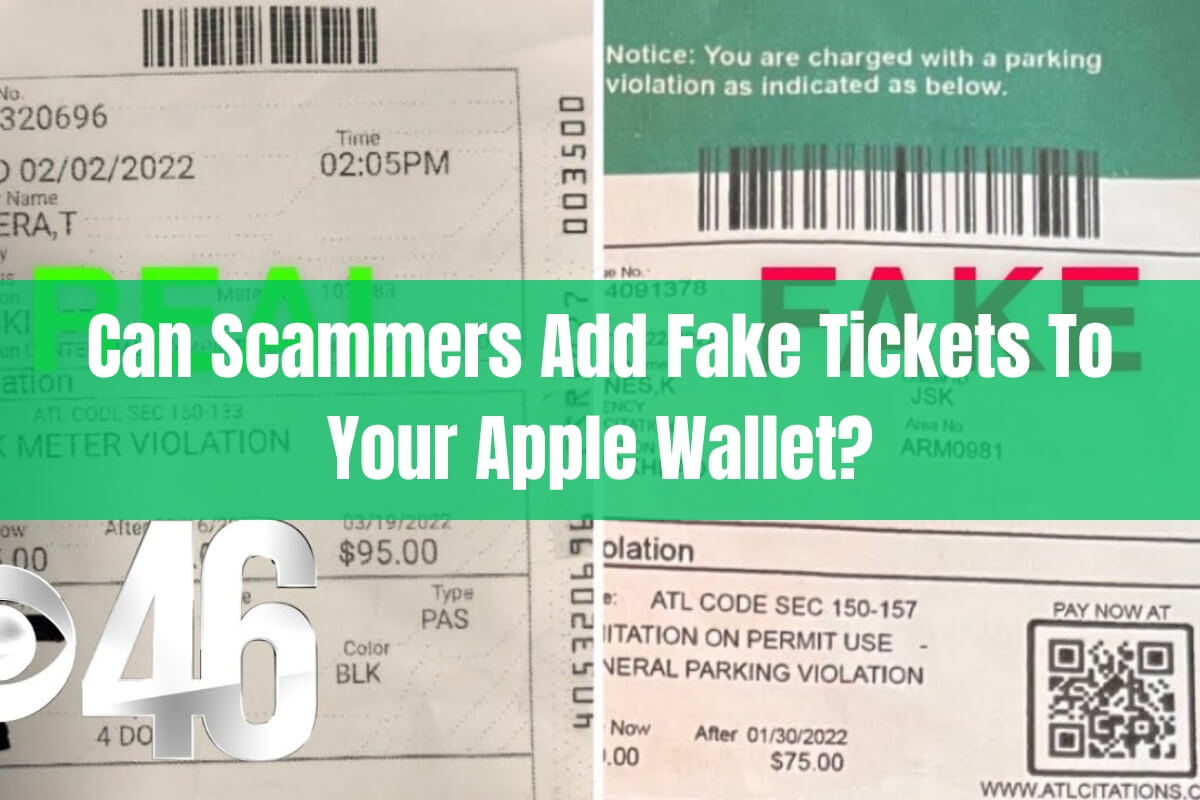
Mobile wallets like Apple Wallet make accessing tickets incredibly convenient. But does that convenience come with risks? Can scammers take advantage of features like Apple Wallet to distribute fake tickets?
As more venues adopt mobile ticketing, and paper tickets become less common, it’s an important question for consumers to consider. This guide examines the growing problem of fake digital tickets, the unique risks of Apple Wallet, and most importantly – how you can avoid falling victim to ticket scams.
How Do Mobile Tickets in Apple Wallet Actually Work?
First, it helps to understand exactly how legitimate mobile ticketing works with Apple Wallet.
Most major ticketing providers like Ticketmaster now issue digital tickets as well as paper tickets. Often, digital tickets are the default option during checkout.
Once you complete a ticket purchase, you’ll receive an email confirmation with ticket delivery instructions. This email will contain a link or button to “Add to Apple Wallet” if mobile tickets are available.
Tapping this link will open the tickets in your iPhone’s Apple Wallet app. From here, the process is straightforward:
- Your ticket barcode appears in Apple Wallet, ready to scan.
- When you reach the event, open Apple Wallet and scan your ticket at the gate.
- For added convenience, double click your iPhone’s side button to quickly open Wallet.
- Your iPhone authenticates your identity via Touch ID or Face ID as you scan.
It’s simple, secure, and completely digital. No need for printed paper tickets vulnerable to damage, loss, or manual counterfeiting.
This mobile ticketing process is great when you’ve purchased from a trustworthy source like Ticketmaster. But here lies the problem…
Fake Tickets Are a Growing Concern in the Digital Age
While mobile ticketing solves some of the issues around paper tickets, it opens up new potential for different types of fraud.
Fake paper tickets have always been an issue. Scammers would photocopy real tickets or print convincing forgeries to sell online and outside venues.
But now some counterfeiters are moving to mobile. A digital fake ticket can be created, added to Apple Wallet, and transferred to unsuspecting buyers.
According to the National Association of Ticket Brokers, approximately 10% of all tickets for high profile events like concerts and championships are counterfeit. As mobile ticketing gains popularity, more of these may shift to digital fakes targeting platforms like Apple Wallet.
Can Forged Tickets Actually Be Added to Your Apple Wallet?
The security experts at Apple have made it extremely difficult to crack an iPhone wallet wide open. Doing so would require deep technical skills well beyond most scammers.
But some researchers have uncovered techniques to circumvent Apple Wallet’s protections:
- Custom code generation – A 2021 study found that barcode generation algorithms could produce forged versions that scanned successfully. This tactic could facilitate fake ticket distribution.
- Intercepted QR code screenshots – Researchers warned about apparent vulnerabilities related to QR codes displayed in Apple Wallet. These codes must remain encrypted and inaccessible to scammers.
- Account hijacking – If a hacker can compromise your Ticketmaster login, they could potentially transfer your real tickets out of your Apple Wallet to another device.
So while Apple Wallet does offer strong security in many ways, holes likely exist that fraudsters are trying to uncover and exploit. It’s an ongoing battle as new vulnerabilities emerge.
How Do Scammers Actually Distribute Fake Apple Wallet Tickets?
If scammers can find ways to generate forged ticket codes, how do they get them onto buyer’s iPhones as Apple Wallet passes? Here are some of the methods to distribute fake digital tickets:
- Peer-to-peer sales – A scammer creates fake Wallet passes and advertises them for sale directly to consumers on Craigslist, Facebook Marketplace, Reddit, or via Twitter and Instagram bots. They distribute via Apple’s transfer tools.
- Compromised accounts – If a scammer hacks your Ticketmaster account credentials through phishing or a data breach, they can sign in and transfer your real tickets to their own Apple Wallet.
- Fake QR screenshots – Scammers could potentially alter authentic-looking QR codes and ask buyers to screenshot the codes into their Wallet. This bypasses the need to actually compromise Ticketmaster accounts.
The key is that scammers aim to make the fake tickets appear legitimate. Simple warnings about paper tickets don’t apply. Let’s explore how to spot fraudulent mobile tickets.
How to Spot Fake Tickets Saved in Your Apple Wallet
With digital tickets, scammers have gotten crafty about making them appear real. But there are a few warning signs that indicate yours may be fake:
- Unreasonably low price – If a resale ticket is suspiciously cheap compared to others from authorized sellers, it could be counterfeit. Legitimate below-market tickets are very rare.
- Spelling errors or typos – Fraudsters often fail to accurately replicate official branding and wording. Look for misspellings, spacing issues, and grammar mistakes.
- Abnormal seller behavior – Respectable resellers and Ticketmaster won’t hesitate to provide proof of purchase or other verification. Scammers may deflect requests or act defensive.
- Unfamiliar vendor – Tickets should only be issued by the official box office or authorized resellers like StubHub. Unknown third parties are higher risk.
If you notice any of these red flags, take steps to validate the tickets before purchase.
Apple Builds Security Into Wallet – But There Are Limitations
Apple Wallet provides some strong protections against fake digital tickets:
- Encrypted passes – Apple uses cryptography to generate secure QR codes that are difficult for scammers to predict and replicate.
- Verified transactions – Your identity is checked via Touch ID or Face ID as tickets are displayed and scanned from Wallet. This adds authentication.
- Integrations with issuers – Direct connections with partners like Ticketmaster facilitate seamless mobile ticket delivery right into Apple Wallet.
However, there are still vulnerabilities that Apple continues working to address:
- Remote distribution – Transfers make it possible for fakes to spread once created, without hacking accounts.
- Screenshot risks – Some researchers warn that QR codes could potentially be intercepted via screenshots. Additional protections may be needed.
- Dependence on issuers – Security still relies heavily onTicketmaster and partners safeguarding the original ticket issuance process.
So Apple Wallet offers notable security benefits for mobile ticketing, but risks around fake passes persist. Fraud is an arms race as scammers evolve.
How Can You Verify an Apple Wallet Ticket is Legitimate?
If you’re unsure about the authenticity of tickets in your Apple Wallet, here are steps to validate them:
- Inspect for errors – Do a close visual inspection looking for any abnormalities, spelling issues, or design inconsistencies.
- Confirm directly with the source – Check ticket details directly with the venue box office or original ticket provider like Ticketmaster.
- Avoid unknown resellers – Only buy from trusted primary and secondary market sellers. Beware of peer-to-peer transactions.
- Ask for purchase documentation – Reputable resellers should provide confirmation of the original ticket purchase.
- Use payment protections – Never pay by wire transfer, gift card, or other irreversible means. Use credit cards with fraud protections.
If at any point you suspect fraud, don’t go through with the purchase. Legitimate sellers will understand your need to verify.
What To Do if You’re Scammed with Fake Apple Wallet Tickets
If you purchase or receive fake tickets in your Apple Wallet, act quickly to get the situation corrected:
- Contact the venue – Alert venue management about the fraudulent ticket and barcode. They may invalidate the fake ticket.
- Reach out to the ticket issuer – If purchased via Ticketmaster or other, notify them of the fake tickets so they can take action.
- Report the scammer – File detailed reports about the scam with the FTC, IC3, and local law enforcement. This helps prevent future victimization.
- Dispute charges – If you paid by credit card, request a chargeback for the fraudulent transaction. Debit payments are tougher to recover.
- Reset account credentials – Change your Ticketmaster password immediately if the scammer got access. Enable two-factor authentication for added security.
- Sign up for fraud monitoring – Consider putting identity theft protection services in place to watch for misuse of any personal data compromised in the scam.
How Consumers Can Avoid Apple Wallet Ticket Scams?
Here are some tips to reduce your chances of getting scammed by fake digital tickets targeting Apple Wallet:
- Only use official ticketing sites – Purchase directly from the box office or authorized sellers like Ticketmaster. Avoid peer-to-peer exchanges.
- Don’t accept transfers from strangers – Only accept ticket transfers from people you know and trust. Avoid buying tickets that have changed hands multiple times.
- Don’t accept transfers from strangers – Only accept ticket transfers from people you know and trust. Avoid buying tickets that have changed hands multiple times.
- Use Apple Wallet payment protections – If purchasing tickets directly within Wallet, use a credit card that offers fraud protections in case you receive invalid tickets.
- Turn on notifications – Enable notifications for ticket transfers out of your Apple Wallet. Scammers may try to silently transfer your tickets to themselves.
- Check tickets immediately before the event – Load tickets in your Wallet shortly before arriving to confirm they are still valid. Report any issues.
- Consider dedicated ticket insurance – Ticket insurance can provide coverage in cases of fraud or if the event is cancelled. This gives you reimbursement options.
Are Apple Wallet Tickets More Secure Than Paper Tickets?
Apple Wallet offers some clear security advantages over paper tickets:
- Reduced fraud – Features like encrypted barcodes and identity verification make widespread counterfeiting more difficult.
- Added accountability – Digital tickets provide more transaction records and traceability vs. exchanging paper tickets anonymously.
- Convenient storage – Storing tickets in Apple Wallet reduces the chances of losing printed paper tickets or leaving them at home.
- Easy transfers – Sending and receiving tickets digitally prevents physical theft and reduces hassles if you need to exchange tickets.
However, some downsides exist too:
- Account risks – Hacking your Apple ID or Ticketmaster account puts tickets stored in your Wallet at risk. Paper tickets don’t have centralized accounts to target.
- Technical attacks – Encryption limits hackers, but does not make mobile tickets immune to things like barcode cracking, custom code generation, and vulnerabilities that emerge over time.
- Scalability challenges – Distributing tens of thousands of instantly transferable mobile tickets poses challenges vs. traditional physical ticket batches.
Ultimately, Apple Wallet offers notable security and convenience improvements. But consumers should remain vigilant as scammers adapt and seek out ways to exploit mobile ticketing platforms.
Final Thoughts on the Future of Fake Digital Tickets
As mobile ticketing becomes more prevalent, fake digital tickets targeting platforms like Apple Wallet seem inevitable. tech-savvy counterfeiters will have financial incentives to uncover vulnerabilities.
Consumers should stay cautious when purchasing tickets from informal sources. And Apple and its partners must continue prioritizing security to stay a step ahead of scammers.
The convenience of mobile ticketing comes with unique risks compared to traditional paper tickets. But by understanding exactly how scammers might target Apple Wallet, and taking steps to carefully validate any tickets, users can enjoy mobile convenience without sacrificing security and peace of mind.
The key is being an informed consumer. Before purchasing any tickets, know the latest scam tactics, buy only from trusted sources, and verify legitimacy. With smart precautions, mobile wallets can provide efficient and more secure management of live event tickets.

